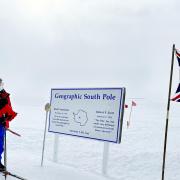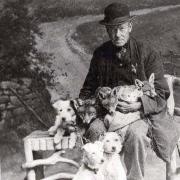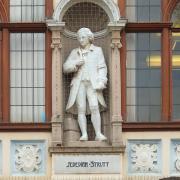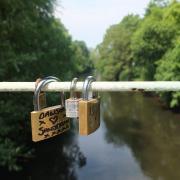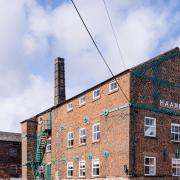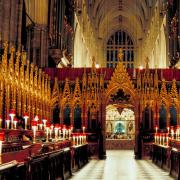Nine months after she has returned to ‘the place that holds my heart’ Bishop Libby Lane talks to Pat Ashworth

Bishop Libby Lane will go down in history as the first woman bishop in the Church of England. She's very grounded and it's a distinction she wears with humility, but she does admit that nobody quite grasped just how high profile that first female appointment would be and how people of all faiths and none would engage with it.
She was consecrated Bishop of Stockport in 2015, continuing to minister in the Diocese of Chester where she'd served as a parish priest for 12 years. Back now in the county that she loves, 'the place that holds my heart', she observes, 'I thought like many people of my generation that I wasn't really rooted anywhere, and I have quite enjoyed being nomadic. But I haven't had to grow to love Derbyshire and Derby because it turns out that that love is very deeply ingrained in me. That's been a lovely surprise.'
Keen observers will notice that her episcopal ring - a gift from her parents - has Blue John running through it rather than the conventional purple strains. 'It's uniquely Derbyshire and every time I put it on, it reminds me of what formed me,' she says. She was born in Buckinghamshire in 1966 but moved as a small child to Glossop, which she describes as 'a lovely, lovely place to grow up.' Primary school, dance classes, Brownies and 'all the other things people do when they're growing up' filled her life: she went on to Manchester High School but had Saturday jobs in a florist, a restaurant and behind a bar in Stalybridge.
Her parents weren't churchgoers but at the age of 11 she started going on her own to a church in nearby Charlesworth, after a friend who lived there invited her along to the tiny youth group that met at St John's Church. 'I thought I ought to turn up to church as well, so I went and I enjoyed it and I went back and they remembered my name,' she says simply, adding, 'I don't know what we would do now with an 11-year-old girl turning up on her own but they were able to just absorb me and to adopt me really into the church family. They showed me what it was to live a Christian life.'

She describes herself as 'the kind of child who liked to join in' and marvels that they let her join in with everything from leading prayers to taking part in church governance during her teenage years - all with the support but slight bemusement of her parents. 'I remember conversations with them suggesting I might want to go to church less and party more…' she says with her ready laugh, and we agree that's not exactly typical. More typical perhaps was her passion for Manchester United: footballers figure prominently when I ask her who were the main influences on her adolescent life.
Her growing sense 'of wanting to live my life in response to Jesus' call to be a disciple, and for that to shape the life I wanted to live', came at a time when women couldn't yet be ordained, so there was a prevailing view that it was fine to have a hobby 'but you might want to find a proper job.' She went to Oxford to read theology, found support for her calling and at the instigation of the Diocese of Derby, spent a taster year after graduation working full-time at St Thomas's Church, Brampton, in Chesterfield. She'd met George, her husband-to-be, at Oxford: they married after graduation and both, during that year, were separately accepted to train for ordination at Cranmer Hall theological college in Durham.
They had two years to wait, and after Chesterfield, spent a year in West Yorkshire doing temporary jobs that paid the rent. The historic vote to ordain women went through in 1993 whilst the couple were training, and so Bishop Libby was among the first women to be priested the following year. Many of the women had waited a long time for this, serving for many years as deacons: for her, she acknowledges with gratitude, 'the door opened at the moment I would have stepped through it anyway.'
It took another 20 years and more for the Church of England to approve the consecration of women as bishops. Bishop Libby was one of eight women priests nominated and elected by their peers to sit as observers in the House of Bishops, which in support of women, had announced that it would no longer sit without women present. In confidence that the legislation would be passed (it went through in 2014), the discernment process for the first female bishop got underway. The Bishop remembers being asked to be considered for the role of Bishop of Stockport as 'a vaguely out-of-body experience.

'I remember sitting in the lobby outside the Bishop's office while the conversation went on, and thinking, "How do we go on from here? Is it possible to say no? Do I say, yes, I'd like to be considered, not knowing definitely that I would be the first but that there was this bigger horizon beyond the role itself, which of itself is significant enough?"'
The rest, as they say, is history. The delight and recognition within the Church of England - particularly amongst those who, Bishop Libby emphasises, had 'waited and prayed and struggled and fought, and for whom it really mattered' - was no surprise to anyone. The tipping point in favour of women bishops had long been reached and this was now just 'the stepping off the edge.' But it was the response of the general public that was extraordinary.
'We hadn't recognised how much it would matter for people outside the church, and it did,' Bishop Libby remembers. 'I had literally thousands and thousands of cards and emails from people who usually began, "I'm not a Christian, but…"; "I don't go to church, but…"; "I'm a Muslim, but…". For six months, I had public recognition every day from complete strangers, whether or not I was wearing my collar.
'People would come up and say, "You're that new bishop, aren't you? I just wanted to say, it makes me feel hopeful, it makes me feel things are possible." They'd say, "It's so nice they've appointed someone who is just a vicar, out of somewhere in the North." I think people felt this was a significant space which could be held by someone like them.'
Four years later, she was chosen to be the next Bishop of Derby. She has been in the job for over nine months now and her delight is still palpable as she puts into action the words she spoke after that announcement: 'Derbyshire nurtured me and brought me to faith and I want to love Derbyshire back.' Her parents still live in Dinting and she has siblings in Tideswell and Ashford-in-the-Water. There's much of the county she still has to explore and she deliberately gets about a lot - 'I want for my own sake to hear and see and touch and smell and be there, but I also want people to see me being there and present and engaging in their communities,' she says.
'There are bits I don't know and I am learning to see the bits I do know differently. Because my experience of a place is not everyone's and there is a risk in coming to a place you think you know. I'm wanting to work quite hard in not imposing my story on what needs to be other people's stories.' She tries to go to different places, prioritises invitations that will involve children and young people, and whether it's politicians, civic and sector leaders or people in business and enterprise, is trying 'to work with others for whom Derby and Derbyshire are their priority: to listen to their wisdom about the things that matter.'
Being Bishop of Derby is the day job but diocesan bishops have national responsibilities too: she now sits in the House of Lords, which she regards as a huge privilege and responsibility. She has chosen to hold external responsibilities as part of her own continuing ministry, as vice-chair of The Children's Society and chair of the governance body for Cranmer Hall. And she is the lead bishop for sport, which as a sports lover herself she describes as fabulous.
'It means the stuff I'm passionate about I can get to engage with,' she says with satisfaction, emphasising, 'It's not just about churches' engagement with sport that matters, the way they use it for wellbeing, but picking up on ways the church needs to take sport seriously on its own terms. It's really significant in terms of identity and community and a huge part of our national economy.' A keen sportswoman and dancer in her earlier life, she still watches it, reads about it and loves it.
Her husband is co-ordinating chaplain to Manchester Airport, and the couple have two grown-up children, Connie and Benedict. Bishop Libby pays warm tribute to her episcopal colleague, the Rt Revd Jan McFarlane, Bishop of Repton, whose ministry in the diocese she praises as really fruitful and widely appreciated. There are now 27 women bishops in the Church of England and Derby is the first diocese to have an all-female episcopal team - not by design but because that's the way it happened at one particular time.
'It's just how it all worked out,' she says. 'It's certainly been good news for me, an extraordinary gift. The outworking of it has been good news for the church, and the living of it is good news for the world.'








